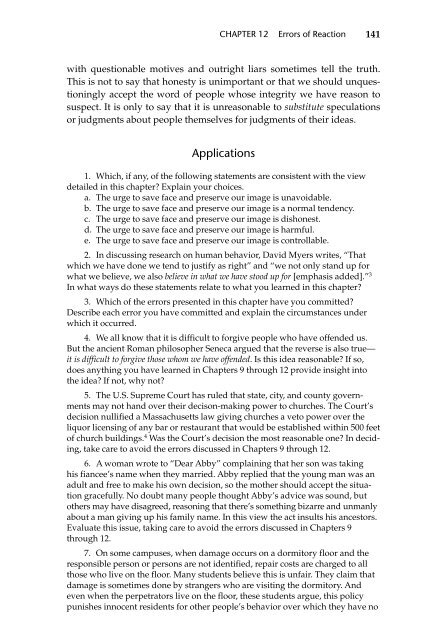Beyond Feelings
Beyond Feelings
Beyond Feelings
You also want an ePaper? Increase the reach of your titles
YUMPU automatically turns print PDFs into web optimized ePapers that Google loves.
CHAPTER 12 Errors of Reaction<br />
141<br />
with questionable motives and outright liars sometimes tell the truth.<br />
This is not to say that honesty is unimportant or that we should unquestioningly<br />
accept the word of people whose integrity we have reason to<br />
suspect. It is only to say that it is unreasonable to substitute speculations<br />
or judgments about people themselves for judgments of their ideas.<br />
Applications<br />
1. Which, if any, of the following statements are consistent with the view<br />
detailed in this chapter? Explain your choices.<br />
a. The urge to save face and preserve our image is unavoidable.<br />
b. The urge to save face and preserve our image is a normal tendency.<br />
c. The urge to save face and preserve our image is dishonest.<br />
d. The urge to save face and preserve our image is harmful.<br />
e. The urge to save face and preserve our image is controllable.<br />
2. In discussing research on human behavior, David Myers writes, “That<br />
which we have done we tend to justify as right” and “we not only stand up for<br />
what we believe, we also believe in what we have stood up for [emphasis added].” 3<br />
In what ways do these statements relate to what you learned in this chapter?<br />
3. Which of the errors presented in this chapter have you committed?<br />
Describe each error you have committed and explain the circumstances under<br />
which it occurred.<br />
4. We all know that it is difficult to forgive people who have offended us.<br />
But the ancient Roman philosopher Seneca argued that the reverse is also true—<br />
it is difficult to forgive those whom we have offended. Is this idea reasonable? If so,<br />
does anything you have learned in Chapters 9 through 12 provide insight into<br />
the idea? If not, why not?<br />
5. The U.S. Supreme Court has ruled that state, city, and county governments<br />
may not hand over their decison-making power to churches. The Court’s<br />
decision nullified a Massachusetts law giving churches a veto power over the<br />
liquor licensing of any bar or restaurant that would be established within 500 feet<br />
of church buildings. 4 Was the Court’s decision the most reasonable one? In deciding,<br />
take care to avoid the errors discussed in Chapters 9 through 12.<br />
6. A woman wrote to “Dear Abby” complaining that her son was taking<br />
his fiancee’s name when they married. Abby replied that the young man was an<br />
adult and free to make his own decision, so the mother should accept the situation<br />
gracefully. No doubt many people thought Abby’s advice was sound, but<br />
others may have disagreed, reasoning that there’s something bizarre and unmanly<br />
about a man giving up his family name. In this view the act insults his ancestors.<br />
Evaluate this issue, taking care to avoid the errors discussed in Chapters 9<br />
through 12.<br />
7. On some campuses, when damage occurs on a dormitory floor and the<br />
responsible person or persons are not identified, repair costs are charged to all<br />
those who live on the floor. Many students believe this is unfair. They claim that<br />
damage is sometimes done by strangers who are visiting the dormitory. And<br />
even when the perpetrators live on the floor, these students argue, this policy<br />
punishes innocent residents for other people’s behavior over which they have no


